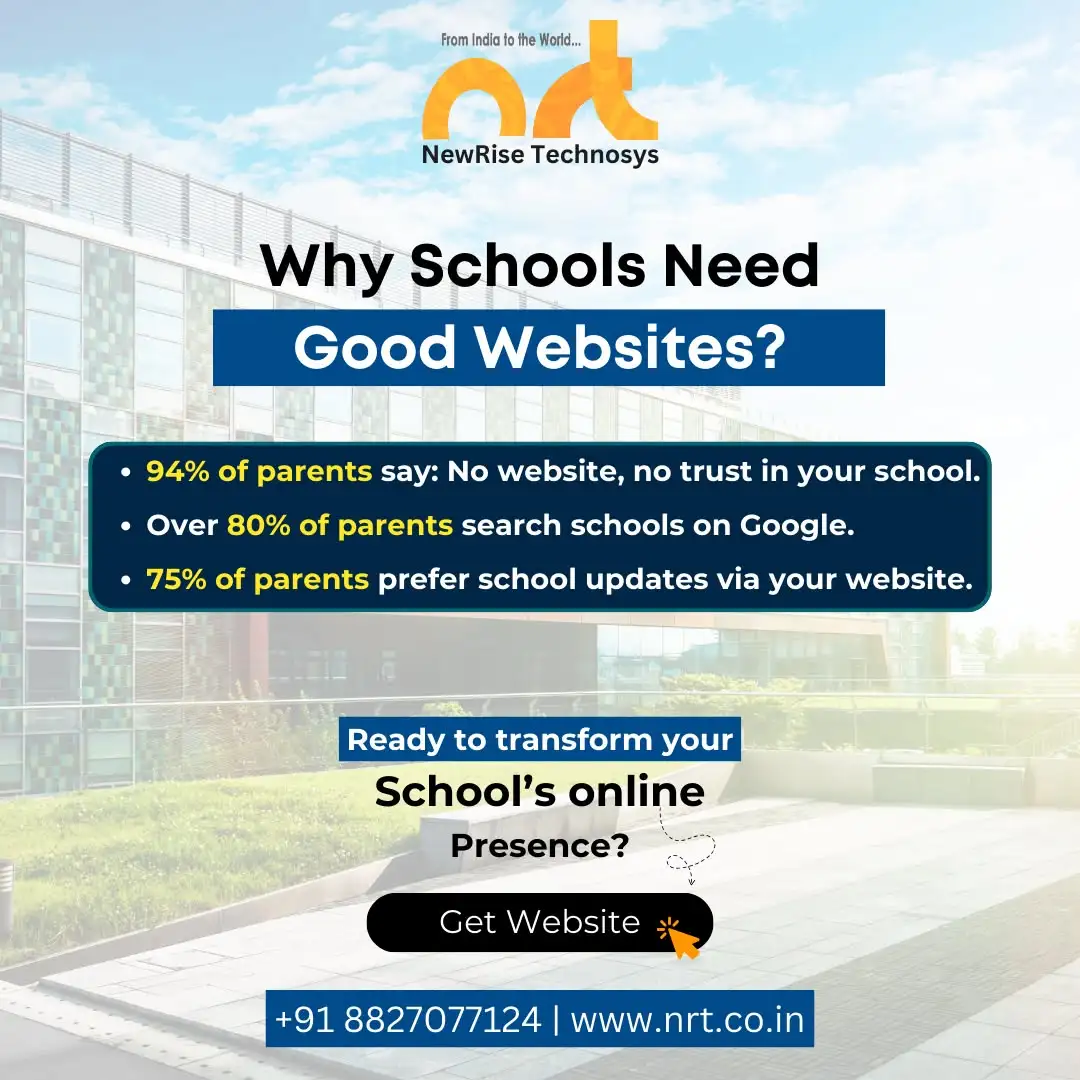Why Schools Need Good Websites
In today’s digital era, a school’s online presence is just as important as its physical infrastructure. A well-designed website acts as a virtual front door, offering parents, students, and educators an accessible and informative platform. Schools without websites risk losing credibility and trust among parents, students, and even prospective staff members.
According to recent statistics:
- 94% of parents believe that a school without a website is not trustworthy.
- Over 80% of parents search for schools on Google before making a decision.
- 75% of parents prefer getting school updates via the school’s website rather than traditional methods like printed notices.
These figures clearly indicate the importance of a website in the education sector. Let’s explore why a school must invest in a high-quality website and how it can transform its reputation and operations.
1. First Impressions Matter: Your Website Reflects Your School’s Identity
For many parents and students, the first interaction with a school happens online. A website provides an opportunity to make a great first impression by showcasing the institution’s vision, mission, curriculum, faculty, and facilities. A poorly designed or outdated website may discourage prospective parents from considering your school for their child’s education.
A modern, easy-to-navigate, and mobile-friendly website conveys professionalism and competence, reinforcing the idea that the school is well-organized and committed to quality education.
2. Enhancing Parental Trust and Engagement
Parents play a significant role in choosing the right educational institution for their children. If they cannot find relevant information about a school online, they may hesitate to trust it. A website allows schools to:
- Provide transparent information about admission procedures, fees, and policies.
- Offer a direct communication channel through contact forms or live chat options.
- Share success stories, student achievements, and testimonials to build credibility.
- Update parents about important announcements, events, and schedules.
A well-maintained school website strengthens the parent-school relationship, ensuring that parents stay informed and engaged in their child’s academic journey.
3. SEO Benefits: Ranking Higher on Google Searches
With over 80% of parents searching for schools on Google, having a website optimized for search engines is a game-changer. Search Engine Optimization (SEO) ensures that your school appears in relevant search results when parents look for schools in their area.
By incorporating keywords like “best school in [city],” “CBSE/ICSE schools near me,” and “top-rated schools in [location],” schools can increase their online visibility. Furthermore, regularly updating the website with blogs, news, and announcements improves search rankings and keeps the content fresh and relevant.
4. Easy Access to School Information
Gone are the days when parents had to visit a school personally to collect brochures or inquire about admissions. A website makes it convenient for prospective parents and students to access information anytime, anywhere. Key details such as:
- Academic curriculum and extracurricular activities
- School faculty and administration details
- Admission criteria and online application forms
- School calendar, holidays, and examination schedules
Having this information readily available saves time for both parents and school administrators.
5. Online Admission and Fee Payment
A well-integrated school website can streamline the admission process by allowing parents to fill out online applications and pay fees electronically. This eliminates paperwork, reduces errors, and enhances user convenience. Schools can also include FAQs to answer common queries about admissions, eligibility criteria, and required documents.
With an efficient online system, schools can simplify administrative tasks while improving the overall experience for prospective students and their families.
6. Communication and Updates in Real Time
A website serves as a centralized platform where schools can post real-time updates and announcements. Whether it’s about:
- Exam schedules and results
- Parent-teacher meetings
- Extracurricular events and competitions
- Emergency notices (such as weather-related school closures)
Having a digital communication channel ensures that parents and students receive information instantly. Schools can also integrate newsletters and email subscriptions to keep stakeholders informed about the latest happenings.
7. Showcasing Student Achievements and Activities
Parents love to see their children’s progress and accomplishments. A website allows schools to highlight:
- Academic achievements and merit lists
- Sports and cultural event highlights
- Student projects and innovations
- Alumni success stories
By sharing such content, schools not only celebrate student success but also attract new admissions by demonstrating a strong track record of excellence.
8. Social Media Integration: Expanding Digital Reach
A website can be linked to the school’s social media pages to expand its digital footprint. Platforms like Facebook, Instagram, Twitter, and LinkedIn help schools:
- Engage with students and parents through interactive content.
- Share live updates, photos, and videos from school events.
- Respond to queries and feedback in real time.
- Foster a sense of community among students, parents, and alumni.
An active social media presence, combined with a strong website, significantly enhances a school’s online reputation.
9. Improving Student Learning Experience
E-learning has become an essential part of education, and a school website can act as a valuable learning resource. Schools can provide:
- Online study materials and assignments
- E-learning modules and video lectures
- Homework submission portals
- Virtual classrooms for distance learning
Such features make learning more accessible and engaging, ensuring that students continue their education seamlessly, even in challenging situations like the COVID-19 pandemic.
10. Security and Data Protection
With the increasing digitization of education, data security has become a top priority. A professional school website should have secure login portals for students, parents, and staff, ensuring confidentiality and data protection. Implementing SSL certificates, encrypted payment gateways, and password-protected portals enhances security and builds trust among users.
Conclusion: Invest in a Professional School Website Today!
A school website is no longer a luxury—it’s a necessity. From attracting new admissions to enhancing communication and engagement, a well-designed website serves as the backbone of a school’s digital presence.
If your school still lacks a website, now is the time to take action. NRT Digital specializes in building professional, SEO-friendly, and mobile-responsive websites tailored to educational institutions. Whether you need a simple informational website or an advanced portal with e-learning capabilities, we can help.




